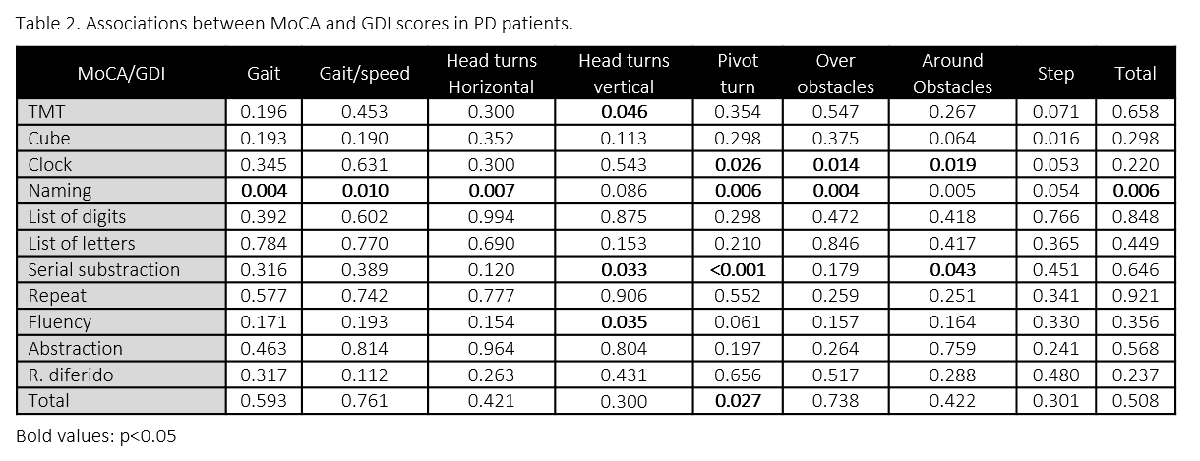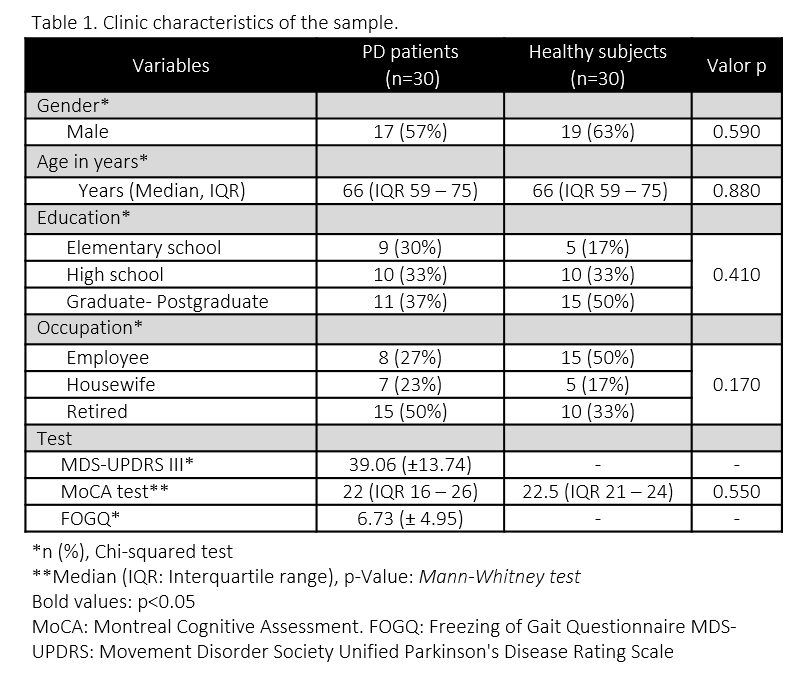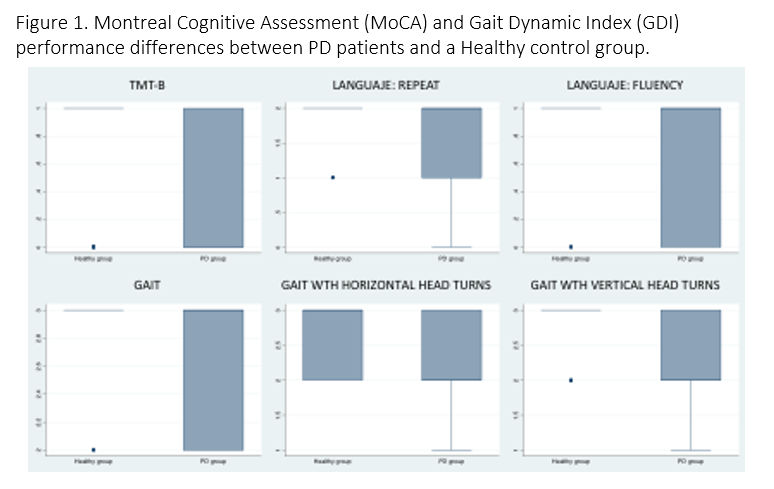Session Information
Date: Wednesday, September 25, 2019
Session Title: Cognition and Cognitive Disorders
Session Time: 1:15pm-2:45pm
Location: Agora 3 East, Level 3
Objective: To explore if balance and freezing of gait correlate with global cognition in patients with Parkinson disease in early stages.
Background: Early alterations in the control of balance and coordination, as well as episodes of freezing, may be present in early stages (1). Executive deficits have been associated with motor disability on PD and greater impact on functionality (2). The interrelation between motor symptoms and cognition could be useful to determine patients with a tendency to a faster progression.
Method: Cross-sectional study. 25 PD patients and 25 healthy subjects (age matched). MDS-UPDRS part III, Dynamic Gait Index (DGI) and Freezing of Gait Questionnaire (FOGQ) were obtained. Global cognition was evaluated using MoCA test. Spearman rho´s was used to assess global cognition and gait. Statistically significant difference was considered if the p-value was lower than 0.05.
Results: Median duration of the disease from onset was 6 years (IQR 1-7). Hoehn and Yahr stage classification were I (16%), II (84%) [table 1]. Significant differences were found for TMT-B (p=0.01), verbal fluency (p=0.01), Gait surface level (p=0.03), Gait with vertical head turns (p=0.01), Gait with horizontal head turns (p<0.001), Gait and pivot turns (p=0.04) and Steps (p=0.04) [table 2]. The MoCA test correlated with FOGQ (rho= -0.048, p=0.018), Age (rho= -0.484, p=0.014); FOGQ correlated with MDS-UPDRS (rho= 0.0263, p=0.026) [table 3]. Conclusions: Executive tasks obtained lower scores in PD patients. GDI is useful to characterize balance disorders in patients yet in early stages. Age, lower scores in Global cognition and MDS-UPDRS were associated with FOG.
Conclusion: Our results indicate that there is a close relationship between posture and global cognition especially in executive, visuospatial and language domains assuming an alteration of dopaminergic and non-dopaminergic circuits. Subsequent analyzes indicate that MoCA is useful in the assessment of global cognition in patients with PD; however, individual item scores should be taken in to account, since they could better characterize the alterations in the cognitive profile of patients with PD.
References: 1. Rochester L, Nieuwboer A, Baker K, Hetherington V, Willems A-M, Kwakkel G, et al. Walking speed during single and dual tasks in Parkinson’s disease: Which characteristics are important? Mov Disord. 2008 Dec 15;23(16):2312–8. 2. Barbosa AF, Voos MC, Chen J, Francato DCV, Souza C de O, Barbosa ER, et al. Cognitive or Cognitive Motor Executive Function Tasks? Evaluating Verbal Fluency Measures in People with Parkinson’s Disease. BioMed Res Int. 2017; 2017:1–7. Acknowledgements: This research (IRB protocol approval number 837) was funded by Colciencias (Contract 845-2017), Fundación Valle del Lili and the Universidad Icesi, Cali, Colombia. The authors thank Colciencias and Centro de Investigaciones Clínicas (CIC) for their continuous support during this research.
To cite this abstract in AMA style:
J. Orozco, J. Valderrama, Y. Castaño, J. Arango, A. Navarro, B. Muñoz. Clinical, motor and global cognition in patients with in early stages of Parkinson disease [abstract]. Mov Disord. 2019; 34 (suppl 2). https://www.mdsabstracts.org/abstract/clinical-motor-and-global-cognition-in-patients-with-in-early-stages-of-parkinson-disease/. Accessed April 25, 2025.« Back to 2019 International Congress
MDS Abstracts - https://www.mdsabstracts.org/abstract/clinical-motor-and-global-cognition-in-patients-with-in-early-stages-of-parkinson-disease/



